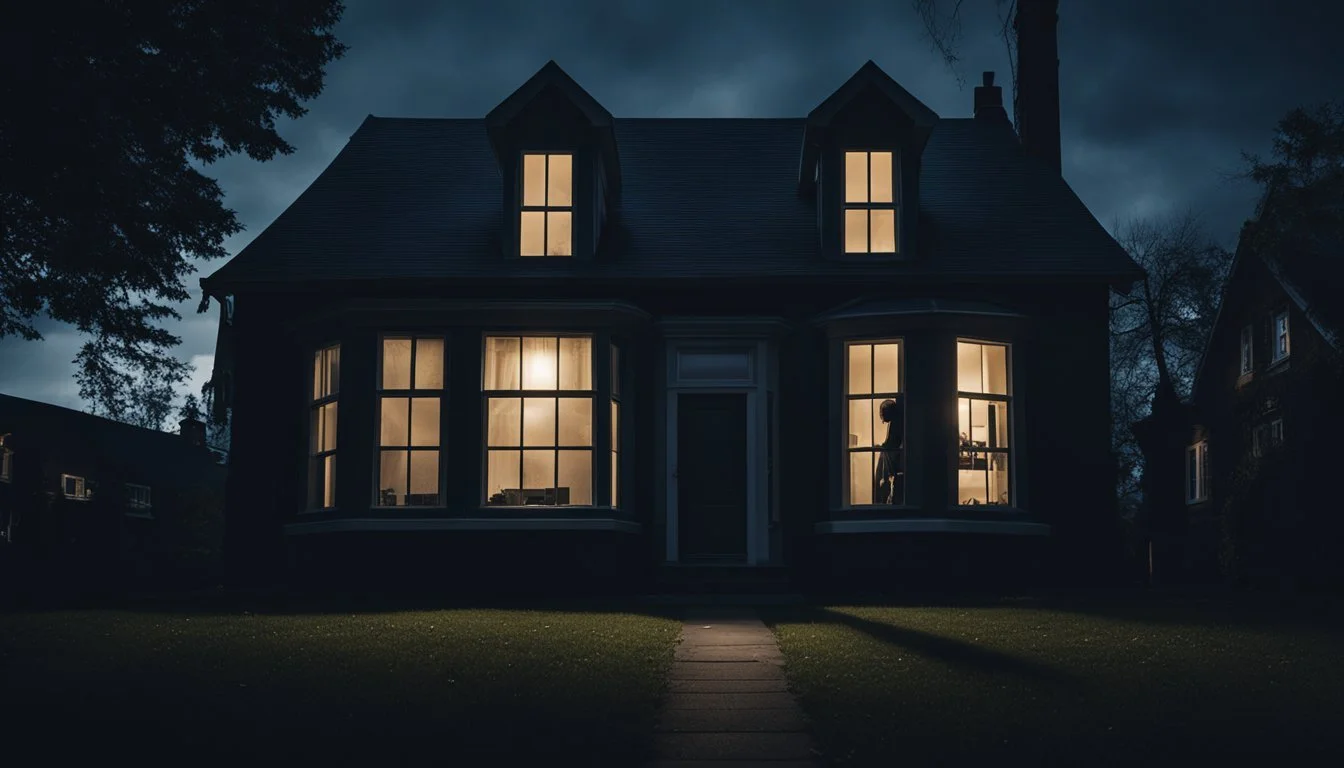6 Chilling Films About the Petit Family Murders in Cheshire, Connecticut
Cinematic Explorations of a Tragic Home Invasion
The Petit family murders in Cheshire, Connecticut shocked the nation in 2007. This brutal home invasion and triple homicide left an indelible mark on the quiet suburban community and captivated the public's attention. The tragic events have since been explored in various films and documentaries, shedding light on the case's chilling details.
Several productions have attempted to portray the Petit family murders, offering different perspectives on this horrific crime. From factual documentaries to dramatized retellings, these films examine the events leading up to the tragedy, its aftermath, and the impact on survivors and the community. Each work provides viewers with a unique lens through which to understand this complex and deeply disturbing case.
1) The Cheshire Murders (2013)
The Cheshire Murders is a powerful documentary film that examines the tragic home invasion and triple homicide that occurred in Cheshire, Connecticut in 2007. Directed by Kate Davis and David Heilbroner, this HBO production provides an in-depth look at the events surrounding the brutal attack on the Petit family.
The film explores the backgrounds of the perpetrators, Steven Hayes and Joshua Komisarjevsky, and delves into their motives for committing such a heinous crime. It features interviews with law enforcement officials, family members, and community residents affected by the tragedy.
Through careful examination of evidence and eyewitness accounts, The Cheshire Murders reconstructs the timeline of events leading up to and during the home invasion. The documentary also raises questions about the criminal justice system and the effectiveness of rehabilitation programs for convicted felons.
The filmmakers present a balanced perspective, allowing viewers to draw their own conclusions about the case and its broader implications for society. This thought-provoking documentary serves as a sobering reminder of the impact of violent crime on families and communities.
More information on The Cheshire Murders
2) In Cold Blood: The Petit Family Tragedy
"In Cold Blood: The Petit Family Tragedy" (2009) is a gripping documentary that examines the horrific home invasion in Cheshire, Connecticut. The film draws parallels to Truman Capote's renowned work "In Cold Blood," which chronicled another shocking crime.
The documentary delves into the events of July 23, 2007, when two intruders entered the Petit family home. It recounts how Jennifer Hawke-Petit and her daughters, Hayley and Michaela, were held hostage and ultimately murdered.
Through interviews and reenactments, the film explores the devastating impact on Dr. William Petit, the sole survivor of the attack. It provides insight into the aftermath and the community's response to this senseless tragedy.
The documentary also examines the legal proceedings against the perpetrators, Linda Hayes (formerly known as Steven Hayes) and Joshua Komisarjevsky. It highlights the debate surrounding the death penalty in Connecticut following this case.
"In Cold Blood: The Petit Family Tragedy" offers a somber reflection on the nature of violence and its lasting effects on families and communities.
More information on the documentary
3) The Dark Night in Cheshire
"The Dark Night in Cheshire" (2007) is a gripping documentary that delves into the harrowing events of July 23, 2007. It focuses on the home invasion and murders that shocked the quiet town of Cheshire, Connecticut.
The film provides a detailed account of the night when two intruders broke into the Petit family home. It explores the tragic fate of Jennifer Hawke-Petit and her two daughters, Michaela and Hayley.
Through interviews with law enforcement, neighbors, and family members, the documentary paints a vivid picture of the crime. It examines the actions of the perpetrators and the response of local police.
The film also touches on the sole survivor, Dr. William Petit Jr., and his journey in the aftermath of the tragedy. It presents a balanced view of the events, allowing viewers to form their own conclusions.
"The Dark Night in Cheshire" serves as a somber reminder of the impact of violent crime on families and communities. It raises questions about home security and the effectiveness of the justice system.
4) Surviving Evil: The Petit Family
Surviving Evil: The Petit Family (2013) is a documentary that recounts the harrowing story of Dr. William Petit Jr., the sole survivor of the Cheshire home invasion. The film provides a detailed account of the tragic events that unfolded on July 23, 2007.
Dr. Petit shares his personal experience of the attack and its aftermath. The documentary explores how he coped with the loss of his wife and two daughters, and his journey towards healing and advocacy.
The film also delves into the criminal investigation and subsequent trials of the perpetrators. It includes interviews with law enforcement officials, prosecutors, and family members, offering a comprehensive look at the case.
Surviving Evil highlights Dr. Petit's resilience and his efforts to honor the memory of his family. It showcases his work with the Petit Family Foundation, which he established to support causes his family held dear.
The documentary provides a thoughtful examination of the impact of violent crime on survivors and communities. It serves as a testament to human strength in the face of unimaginable tragedy.
5) The Unforgivable Crime: Cheshire, CT (2013)
"The Unforgivable Crime: Cheshire, CT" is a gripping documentary that examines the horrific home invasion and murders of the Petit family. The film provides a detailed account of the events that unfolded on July 23, 2007, in the quiet town of Cheshire, Connecticut.
Through interviews and archival footage, the documentary explores the brutal attack on Dr. William Petit Jr., his wife Jennifer, and their two daughters, Hayley and Michaela. It delves into the actions of the perpetrators, Linda Hayes (formerly Steven Hayes) and Joshua Komisarjevsky.
The film offers insight into the investigation, trial, and aftermath of the tragedy. It highlights the impact on the community and raises questions about the criminal justice system. Viewers are presented with a comprehensive look at one of the most shocking crimes in Connecticut history.
"The Unforgivable Crime: Cheshire, CT" serves as a somber reminder of the devastating consequences of violent crime. It pays tribute to the victims while examining the broader implications of this tragic event.
6) Crime Scene: The Petit Family Murders (2022)
"Crime Scene: The Petit Family Murders" is a documentary that examines the tragic events of July 23, 2007, in Cheshire, Connecticut. The film explores the home invasion that resulted in the deaths of Jennifer Hawke-Petit and her two daughters, Hayley and Michaela.
Through interviews and archival footage, the documentary provides a detailed account of the crime. It delves into the actions of the perpetrators, Linda Hayes (formerly Steven Hayes) and Joshua Komisarjevsky, who initially planned to rob the Petit home.
The film also focuses on Dr. William Petit, the sole survivor of the attack. It chronicles his journey of rebuilding his life after the loss of his family. The documentary examines the impact of the crime on the community of Cheshire and the broader implications for home security.
"Crime Scene: The Petit Family Murders" offers a balanced perspective on the events, presenting facts without sensationalism. It serves as a somber reminder of the devastating consequences of violent crime.
Detailed Account of the Petit Family Murders
The Petit family murders in Cheshire, Connecticut on July 23, 2007 shocked the nation with their brutality. Two intruders broke into the home, leading to a horrific series of events that left three family members dead and one severely injured.
Timeline of Events
July 22, 2007: Joshua Komisarjevsky spots Jennifer Hawke-Petit and her daughter at a local supermarket. He follows them home and plans a break-in with his accomplice, Steven Hayes.
July 23, 2007, 3:00 AM: The perpetrators enter the Petit home through an unlocked basement door.
3:30 AM: Dr. William Petit is attacked in his sleep and tied up in the basement.
5:00 AM: Jennifer Hawke-Petit is forced to withdraw $15,000 from a local bank.
9:00 AM: Police arrive at the scene after being alerted by bank staff.
10:00 AM: The house is set on fire. Dr. Petit escapes, but Jennifer and her two daughters perish.
Profiles of the Perpetrators
Joshua Komisarjevsky
Age at time of crime: 26
Criminal history: Multiple burglary convictions
Role: Mastermind of the break-in
Sentenced to death in 2011 (later commuted to life imprisonment)
Steven Hayes
Age at time of crime: 44
Criminal history: Drug-related offenses
Role: Accomplice to Komisarjevsky
Sentenced to death in 2010 (later commuted to life imprisonment)
Both men had histories of substance abuse and met in a halfway house. They claimed the initial plan was only to rob the Petit home, but events escalated tragically.
Impact on the Community
The Petit family murders profoundly affected Cheshire, Connecticut, causing deep emotional scars and prompting changes in local law enforcement practices. Residents grappled with fear and grief while authorities reassessed security measures.
Emotional and Psychological Effects
The brutal home invasion shattered Cheshire's sense of safety. Neighbors experienced heightened anxiety and paranoia, with many installing security systems and reinforcing doors and windows. Local counselors reported an increase in trauma-related issues, particularly among families with children.
Community gatherings and vigils provided spaces for collective mourning. The Petit Family Foundation, established in memory of the victims, became a source of healing for many residents. It focused on supporting the education of young people, especially women in the sciences.
Schools implemented additional counseling services to help students cope with the tragedy. Some families chose to move away from Cheshire, unable to shake the fear instilled by the murders.
Changes in Local Law Enforcement
The Cheshire Police Department faced criticism for their response to the home invasion. This led to a comprehensive review of protocols and procedures. Officers received additional training in hostage situations and home invasions.
The department increased patrols in residential areas and implemented community outreach programs to foster better relationships with residents. They also upgraded their communication systems to improve response times.
Local lawmakers pushed for stricter penalties for home invasions and violent crimes. The case influenced discussions on parole policies and the monitoring of repeat offenders. Cheshire police began working more closely with state and federal agencies to share information on career criminals.



